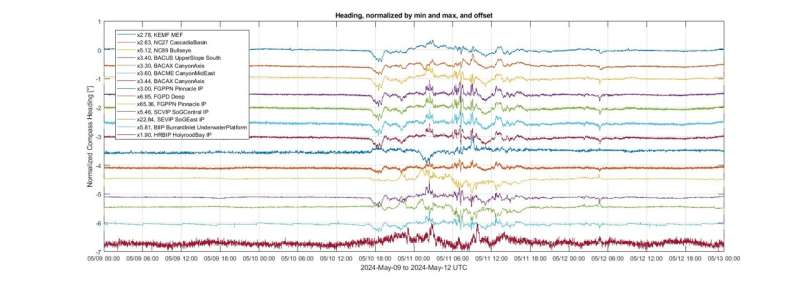The powerful solar storm driving the aurora borealis over global skies last weekend was also triggering the movement of compasses deep in the ocean, as revealed in new scientific findings shared today by Ocean Networks Canada (ONC), a University of Victoria initiative.
ONC’s subsea observatories on the west and east coasts of Canada recorded the temporary distortion of the Earth’s magnetic field on instrument platforms deployed as deep as 2.7 kilometers under the ocean surface, potentially some of the most remote recordings ever captured.
The most significant magnetic shift moved the direction of the compass within a range of +30 to -30 degrees and was recorded at a depth of 25 meters at the Folger Passage subsea site, which is part of the ONC NEPTUNE cabled observatory off the coast of Vancouver Island.
Geomagnetic disturbances can pose risks to power grids, satellite networks, and navigation systems as well as impact animals’ own navigational abilities.
“The reach of these data recordings kilometers under the ocean surface highlight the magnitude of the solar flare over the past weekend and suggest that the data may be useful for better understanding the geographic extent and intensity of these storms,” says Kate Moran, ONC president and CEO.
The discovery of these solar storm magnetic disturbances happened during data quality control checks. ONC primarily uses compasses to orient its Acoustic Doppler Current Profilers (ADCP) instruments which measure ocean currents.

Alex Slonimer, a scientific data specialist at ONC, was completing a daily check on the data in late March when he first noticed an anomaly in the numbers showing up in the Ocean 3.0 Data Portal.
“I looked into whether it was potentially an earthquake, but that didn’t make a lot of sense because the changes in the data were lasting for too long and concurrently at different locations,” Slonimer explains. “Then, I looked into whether it was a solar flare as the sun has been active recently.”
This past weekend’s much larger solar storm event reinforced the observation, he adds, with the peaks in the compass headings closely correlated to the peaks in the visible activity in the aurora.
Justin Albert, professor of physics with UVic’s Department of Physics and Astronomy, welcomes the new subsea geomagnetic detections.
“The next two years will be the peak of the 11-year solar cycle. After a decade of relative inactivity, aurora events like this past weekend are likely to become more frequent over the next couple of years, although solar variability makes precise prediction of such events impossible,” says Albert.
“ONC’s network might provide a very helpful additional window into the effects of solar activity on the Earth’s terrestrial magnetism.”
Provided by
University of Victoria
Citation:
Solar storm detected in deep sea observatories (2024, May 16)
retrieved 16 May 2024
from
This document is subject to copyright. Apart from any fair dealing for the purpose of private study or research, no
part may be reproduced without the written permission. The content is provided for information purposes only.